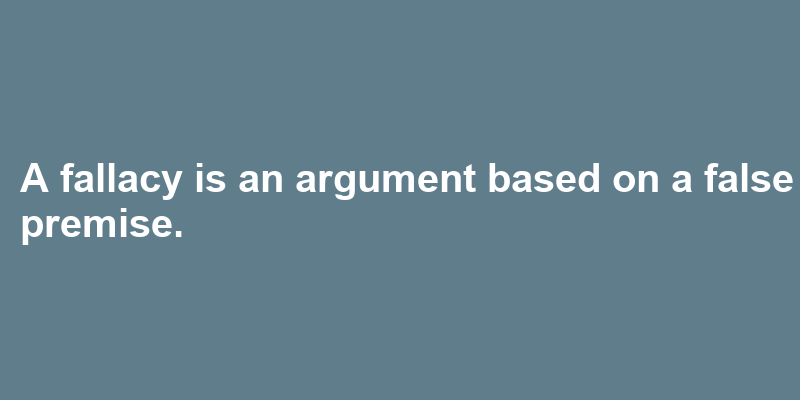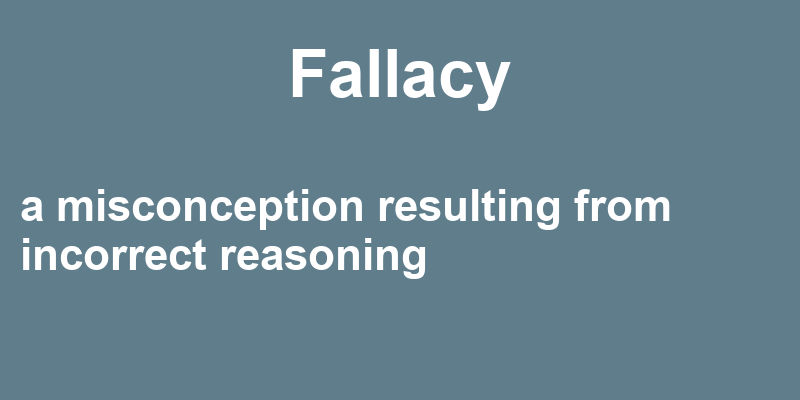Definition of Fallacy
fallacy (noun) - a misconception resulting from incorrect reasoning
View other definitions
How can fallacy be used in a sentence?
A fallacy is an argument based on a false premise.
Source
nullIt seems safe to call a fallacy the idea that civilization excludes wild life.
Source
nullA fallacy is "an argument which provides poor reasoning in support of its conclusion."
Source
nullThe ecological fallacy occurs whenever one tries to infer from averages to individuals.
Source
nullIt's sometimes very effective in that implied within the fallacy is a charge of hypocrisy.
Source
nullAccording to traditional accounts, a fallacy is a pattern of poor reasoning which appears to be
Source
nullKornbelt888: A fallacy is "an argument which provides poor reasoning in support of its conclusion."
Source
nullThe false dilemma fallacy limits the choices given even if other valid choices are there but not used.
Source
nullThe implied fallacy is that the character of a speaker doesn't reflect on the strength of his argument.
Source
nullIn logic and rhetoric, a fallacy is a misconception resulting from incorrect reasoning in argumentation.
Source
nullThis is called the fallacy of subjective (or personal) validation, the "I tried it and it worked" argument.
Source
nullThe main fallacy is that the tax does not acknowledge the largely static nature of short term energy demand.
Source
nullThe fallacy is the requiring variation in domesticity to go beyond the limits of the same variation under nature.
Source
nullAre we not in danger of falling into what many philosophers of science call the fallacy of misplaced concreteness?
Source
nullAnother fallacy is the idea that traps are set indiscriminately, leaving some people to believe that pets are in danger.
Source
nullIn technical language, it might be described as the fallacy of putting what is intelligible in the place of what is true.
Source
nullFebruary 7th, 2010 at 11: 30 am gummitch -- this space for rent says: drhunt: A fallacy is an argument based on a false premise.
Source
nullThis fallacy, which is not uncommon in practice where the terms are complicated, is known as the fallacy of the undistributed middle.
Source
nullWhile the common usage of the word fallacy deceptive argument which seems correct, but upon further examination is found to be incorrect.
Source
nullAnd yet in this idea there lies a fallacy, and the fallacy is the belief that in this modern world there is any such thing as independence.
Source
nullThe fallacy is the conception of the Cosmos as something separate and apart from man, as something through which he, however briefly, passes.
Source
nullThe fallacy is assuming the words on the surface "save jobs", "protect domestic manufacuring" etc. are the real motivation for the transaction.
Source
nullTo this the reply seems to be that it is with prayer as it is with argument: a fallacy is a fallacy, just as much before it is detected as afterwards.
Source
nullAnother major fallacy is that the science is tracking or lead by the politics. 100% untrue and suggests a fundamental misunderstanding of the nature of science.
Source
nullThe fallacy occurs when a writer likens the transistors in a computer to the synapses in a brain, usually as part of an effort to make computers seem like brains.
Source
nullHaha, I'll have to remember that when I bump into my attorney amigos ... and I really wasn't trying to be a smart ass, that's what the fallacy is technically called.
Source
nullThe generalisation of the second kind of unity, namely, that derived from scientific laws, would be equally fallacious, though the fallacy is a trifle less elementary.
Source
nullThe fallacy is that you are accepting the father's testimony while omitting the countervailing evidence that convinced an independent jury of the defendant's innocence.
Source
nullI recently wrote a post that was partly about how the fallacy is used to "prove" sex discrimination in wages ... just like it's been used to "prove" genetic inferiority.
Source
null* The Base Rates fallacy occurs whenever a conclusion is drawn about a phenomenon without looking at the rate of some occurrence in the entire population (the base rate).
Source
nullHe there shows that the fallacy is a material one: being a false assumption of the major premise, viz., that the sum of an infinite series is itself always infinite (whereas it may be finite).
Source
nullThis may be called the fallacy of transcendent inference: since the Canons are only applicable to instances of events that can be compared; they cannot deal with that which is in its nature unique.
Source
nullWhile there may be some truth to this assertion with regard to holding (and even some purchasing of) Treasuries, the analysis suffers from a common economic fallacy, that is, the sunk-cost argument.
Source
nullThus it is, that the Poet's idea of "distance lending enchantment to the view," is not merely a fanciful idea, but a serious practical fallacy, which is constantly imposing upon mankind in some form or other.
Source
nullA false equivalence fallacy occurs when someone falsely equates an act by one party as being equally egregious to that of another without taking into account the underlying differences which may make the comparison patently invalid.
Source
nullAdditionally, it is logically invalid to make inferences about a group based on the actions on a few individuals, and in particular when evidence is excluded to bias the result (in statistics, this is called the fallacy of exclusion).
Source
nullIn response to your first point, you allude to the idea that the viewer has to come to one conclusion or another (either violence against oppressors or non-violence) which essentially poses a false dilemma fallacy: these are the only two options of action.
Source
nullI used to have a simple answer to this question: In conflating the rights of the individual with those of the collective, liberals were guilty of what logicians call the fallacy of composition: the notion that what is true of a part must also be true of the whole.
Source
nullThe association of the names unfortunately makes us think of the countries as a whole, a word fallacy that leads to illimitable disaster.] [Footnote 66: p. 91.] [Footnote 67: The variability of war stories may be observed also in the columns of the _Times_ during the Crimean War.
Source
null+ The ultimate reasons for the mother family and for a change to the father family are in the life conditions, industrial arts, war, pressure of population, etc. In fact, our terms are only names for a group of mores which cover some set of interests, and we need to be on our guard against the category fallacy, that is, against arguing from the contents of the classification which we have made.
Source
null
Tips for Using fallacy in a Sentence
You may have an easier time writing sentences with fallacy if you know what words are likely to come before or after it, or simply what words are often found in the same sentence.
Frequent Predecessors
Words that often come before fallacy in sentences. For example: "the fallacy" or "a fallacy"
- the
- a
- this
- pathetic
- of
- naturalistic
- logical
- intentional
- common
- ecological
Frequent Successors
Words that often come after fallacy in sentences. For example: "fallacy of" or "fallacy ."
- of
- .
- in
- is
- that
- to
- and
- which
- has
- as
Associated Words
Words that aren't necessarily predecessors or successors, but are often found in the same sentence.
- sorites
- fallacies
- syllogism
- fallacious
- equivocation
- reification
- deductive
- inferring
- disjunct
- relativism
Alternate Definitions
- fallacy (noun) - deceptiveness; deception; deceit; deceitfulness; that which is erroneous, false, or deceptive; that which misleads; mistake
- fallacy (noun) - specifically— a false syllogism; an invalid argumentation; a proposed reasoning which, professing to deduce a necessary conclusion, reaches one which may be false though the premises are true, or which, professing to be probable, infers something that is really not probable, or wants the kind of probability assigned to it
- fallacy (noun) - <em>begging the question</em>, or the <em>petitio principii</em>, a syllogism, valid in itself, but in which that is affirmed as a premise which no man who doubts the conclusion would admit
- fallacy (noun) - deceptive or false appearance; deceitfulness; that which misleads the eye or the mind; deception
- fallacy (noun) - an argument, or apparent argument, which professes to be decisive of the matter at issue, while in reality it is not; a sophism

